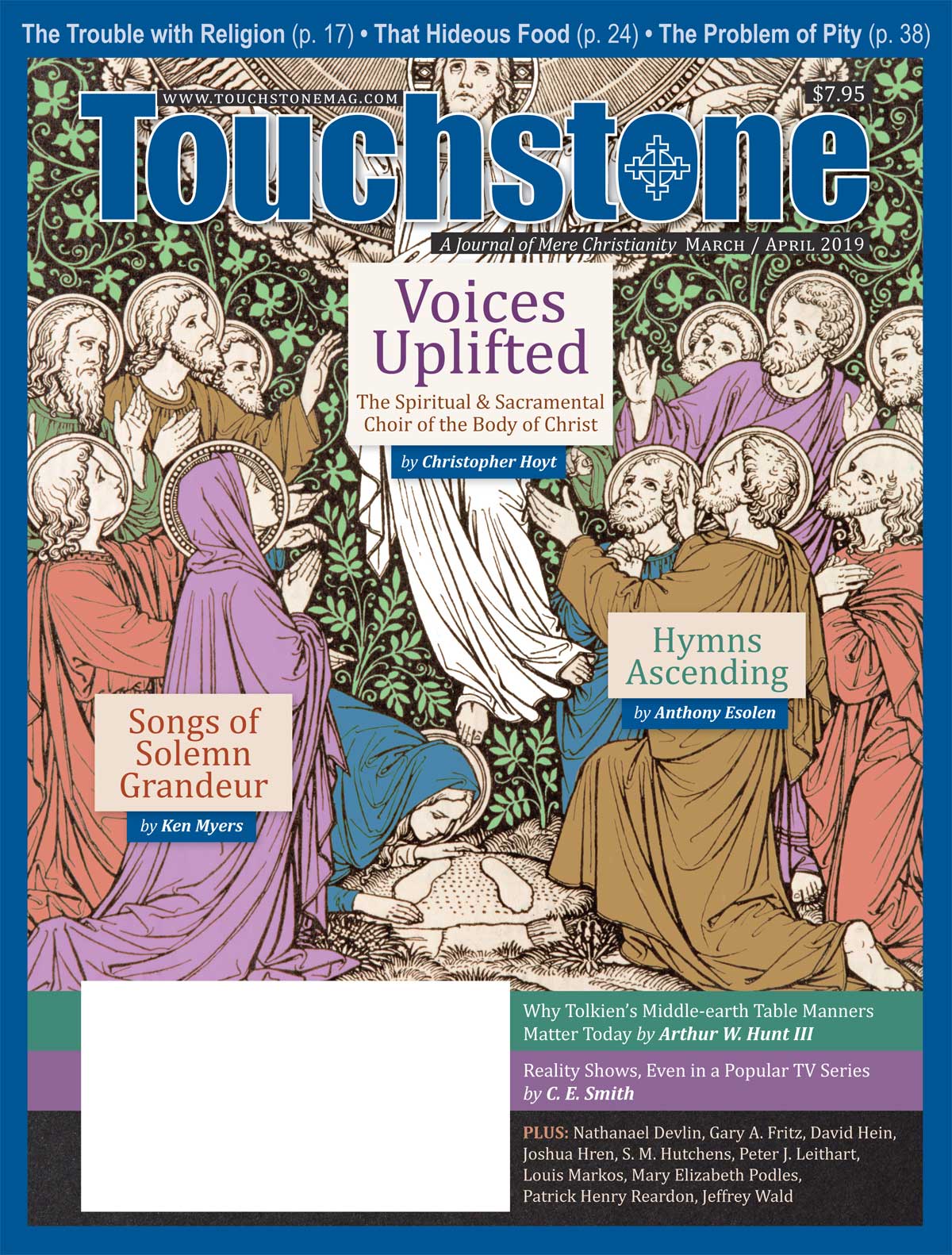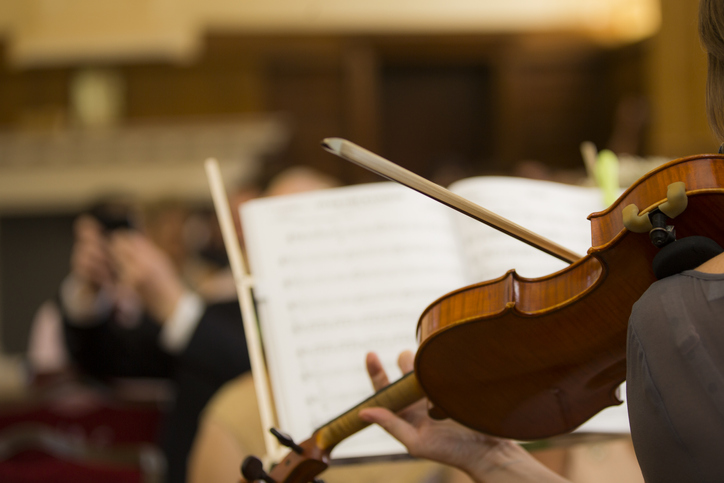Feature
Voices Uplifted
The Spiritual & Sacramental Choir of the Body of Christ
by Christopher Hoyt
For the modern English speaker, the words "wind," "breath," and "spirit" each conjure a different sort of mental image. "Wind" may summon up the picture of tree limbs swaying in the breeze. For "breath," one might imagine a windowpane fogged by exhalation or a diagram of human lungs. "Spirit" conveys still another sort of idea: Scrooge's midnight visitors or a genie from a lamp. In our minds, these three—wind, breath, and spirit—are sharply differentiated ideas that do not overlap much with one another, and our evolving English language has assigned a separate term to each.
But in the biblical languages of Hebrew and Greek it was not so. The single Greek word pneuma or Hebrew word ruach embraced all three of these concepts: the currents of air that travel to and fro across the earth, the respirations of the body, and the life that transcends the flesh. The vocabulary of the biblical authors thus furnished a single, composite word-idea that our language has divided into three. One can see this in our English translations of John 3:8, which often supply two different renderings of the Greek word pneuma: "The wind [pneuma] blows where it wishes, and you hear the sound of it, but cannot tell where it comes from and where it goes. So is everyone who is born of the Spirit [pneuma]" (NKJV).
As in language, so in thought: the clean separation between the ideas of wind and breath and spirit that our language imposes upon us did not exist for thinkers in the biblical era. To them, clouds drifting on a breeze, a man puffing from exercise, and the "light of the eyes" were all manifestations of the same thing, the ruach or the pneuma. Each of those particular instances participated in a larger, composite idea or "ancient unity," as Owen Barfield named it.
Tuning Man's Whole Being to God
Singing, then, must have seemed a different sort of activity to ancient thinkers than it does to us now. Singing presumes breathing, so any singer in the ancient world would have been—to their way of thinking—literally "full of the spirit." This elucidates a parallelism in the Apostle Paul's words: "be filled with the Spirit, speaking to one another in psalms and hymns and spiritual songs, singing and making melody in your heart to the Lord" (Eph. 5:18b–19).
When one sings, one is resonated by the pneuma, the wind-breath-spirit. One becomes an instrument very much like a flute or an oboe. The vibrations produced by the pneuma do not merely involve lungs and larynx. The entire human body serves as a resonance chamber for the voice, in much the same way as the body and bell of a clarinet enable its speech. And when one is singing in worship, this resonance extends beyond mere physical vibrations and into the metaphysical world as well. I hope that every reader has experienced the reverberations of heart and mind that accompany fervent congregational singing. For any who have had such an experience, it is not hard to perceive a hymn as an act of obedience to Jesus' command, "You shall love the Lord your God with all your heart, with all your soul, with all your mind, and with all your strength." Pious singing unites all the human faculties in a single act, tuning man's whole being to God.
This insight did not escape the ancients. Athanasius mentions it in his letter to Marcellinus:
When, therefore, the Psalms are chanted, it is not from any mere desire for sweet music, but as the outward expression of the inward harmony obtaining in the soul, because such harmonious recitation is in itself the index of a peaceful and well-ordered heart. To praise God tunefully upon an instrument, such as well-tuned cymbals, cithara, or ten-stringed psaltery is, as we know, an outward token that the members of the body and the thoughts of the heart are, like the instruments themselves, in proper order and control, all of them together living and moving by the Spirit's cry and breath. (The Life of Antony and the Letter to Marcellinus, translated by Robert C. Gregg, Paulist Press, 1980)
One can hear in Athanasius an echo of Paul's exhortation, "present your bodies a living sacrifice, holy, acceptable to God, which is your reasonable service. And do not be conformed to this world, but be transformed by the renewing of your mind" (Rom. 12:1–2). Worshiping in song is a way of transforming oneself into that living sacrifice; the aptly named "offertory" sung in church services today is an offering of the worshipers' own selves. Such a parallel between sacrifice and music appears in the temple worship of the Old Testament. Second Chronicles 23:18, for example, mentions that King David specifically paired music with the burnt offerings of the tabernacle; strains of melody rose heavenward along with the smoke of the burning animal.
Doubly Sacramental
Christopher Hoyt is the author of Under Authority: Practicing Submission in a Rebellious Society (Anglican Liturgy Press, forthcoming). He teaches the humanities at Good Shepherd School (Reformed Episcopal) in Tyler, Texas. He is the general editor of the hymnal The Book of Common Praise/Magnify the Lord, an Adjunct Professor of Sacred Music at Cranmer Theological House (Reformed Episcopal), and the organist/choirmaster at Good Shepherd Church in Tyler.
Share this article with non-subscribers:
https://www.touchstonemag.com/archives/article.php?id=32-02-034-f&readcode=10185
subscription options
Order
Print/Online Subscription

Get six issues (one year) of Touchstone PLUS full online access including pdf downloads for only $39.95. That's only $3.34 per month!
Order
Online Only
Subscription

Get a one-year full-access subscription to the Touchstone online archives for only $19.95. That's only $1.66 per month!
bulk subscriptions
Order Touchstone subscriptions in bulk and save $10 per sub! Each subscription includes 6 issues of Touchstone plus full online access to touchstonemag.com—including archives, videos, and pdf downloads of recent issues for only $29.95 each! Great for churches or study groups.
Transactions will be processed on a secure server.
more on music from the online archives
more from the online archives
calling all readers
Please Donate
"There are magazines worth reading but few worth saving . . . Touchstone is just such a magazine."
—Alice von Hildebrand
"Here we do not concede one square millimeter of territory to falsehood, folly, contemporary sentimentality, or fashion. We speak the truth, and let God be our judge. . . . Touchstone is the one committedly Christian conservative journal."
—Anthony Esolen, Touchstone senior editor











